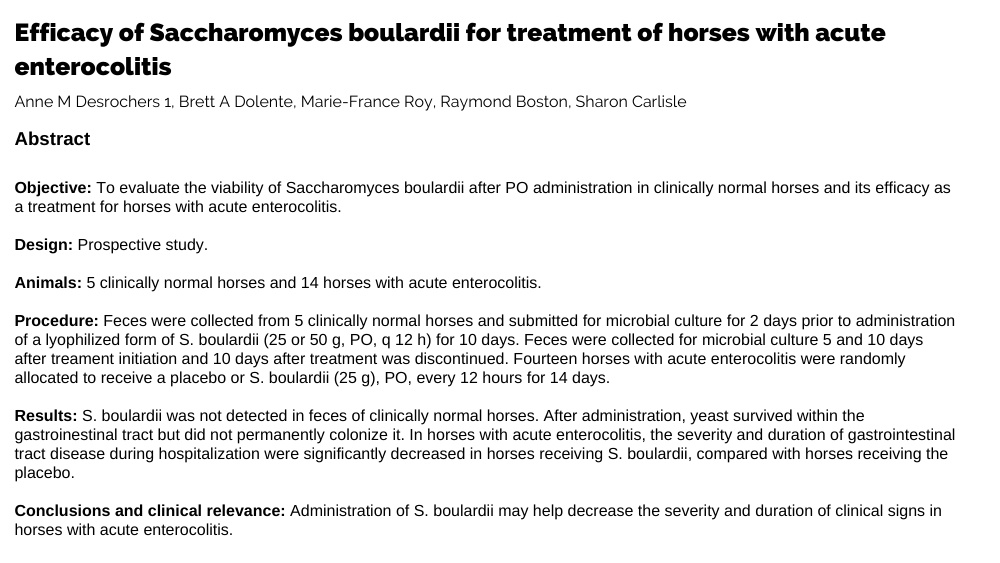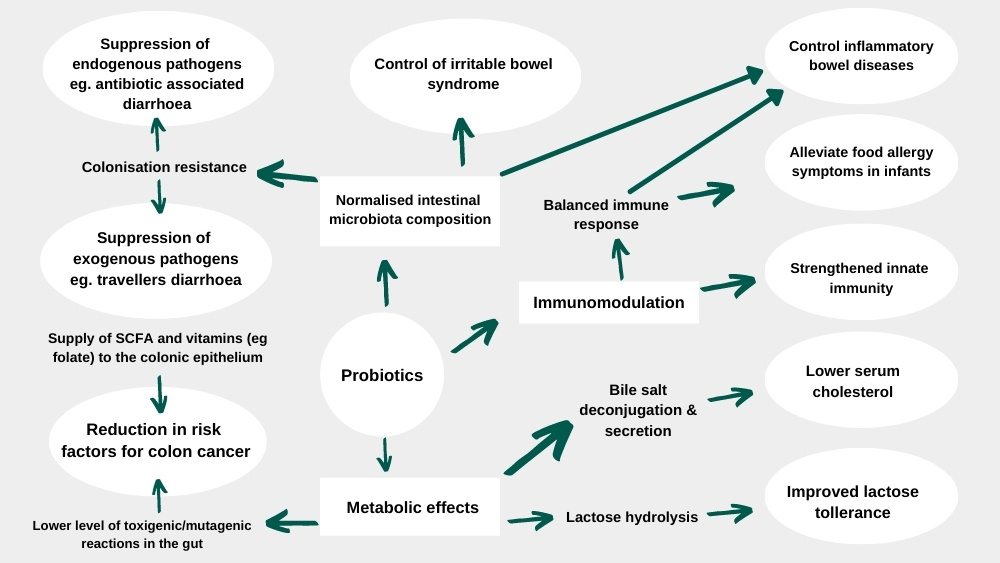- The Horse Liver - January 6, 2022
- Nutritional Support of Horse Muscles - January 4, 2022
- Sweet Itch in Horses - December 15, 2021
First, definitions to explain probiotics and prebiotics for horses.
What are Horse Probiotics?
Probiotics are live organisms that have been demonstrated to have a positive effect on intestinal function and/or health in general.
What are Horse Prebiotics?
Prebiotics are substances that support the survival of probiotic organisms in the intestinal tract.
Probiotics and Prebiotics for Horses
The relationship between the horse’s body and the microbes inhabiting the intestinal tract is complicated. Their involvement in the fermentation of fibre is obviously beneficial to both. The horse presents them with food and can use the byproducts of fermentation as an energy source.
Organisms in the stomach and small intestine can utilize sugar and starch, reducing the burden on the horse’s digestive enzymes. The organisms are also a supplementary source of B vitamins. Thriving populations of harmless bacteria reduce the risk of intestinal infections with organisms like Salmonella or Clostridia. They do this by sheer numbers, by blocking access to bindings sites and also in some cases by secreting antibacterial substances called bacteriocins.
See the discussion section here at the American Society for microbiology for more information.
The organisms interacting with the immune system is complex and research has found that interactions between the immune system and the bacteria colonizing it can have profound effects.
Probiotics in humans are defined as bacterial strains capable of colonising and surviving in the gut which has a beneficial effect on their host by suppressing the growth of harmful bacteria and interacting with the immune system. Documented effects of probiotics to date include:
- I. regulate cytokines and regulatory lymphocytes
- II. encourage production of protective mucus by the intestinal cells
- III. reduce inflammation
- IV. increase production of the antibody IgA while decreasing the risk of allergy
Detailed information is available for humans regarding types and specific strains of bacteria that fit the definition of probiotics. Unfortunately, not as much information is available for horses. The involvement of Lactobacilli is a safe guess since the upper intestinal tract of people and horses function similarly and we already know the upper intestine and stomach of the horse are colonized by Lactobacilli. Beyond that, we don’t know. For example, the Bifidobacteria so beneficial in humans are not found in horses.
Which probiotic organisms are beneficial to horses?
A 2008 study from Slovakia identified three strains (out of 25) of Enterococcus faecium (from the family lactobacilli) from the manure of horses that on preliminary investigation may have probiotic potential. However, this needs further work to confirm.
Prebiotic lactobacillus fermentation products are one of the few available options that have actually been proven to be beneficial to horses as this study in America demonstrates:
Wild Mustang Study
On March 25, 1988, 67 wild horses were started on a field study for Cytozyme Laboratories, Inc., of Salt Lake City, Utah. The purpose of this study was to determine what effect, if any, the addition of Ration Plus™ For Horses would have on the overall nutritional plane of a group of stressed horses.
These horses had just been received at the Wild Horse Training Facility, Los Lunas Correctional Center, Los Lunas, New Mexico. The Bureau of Land Management had contracted with the New Mexico Department of Corrections for the gentling and halter breaking of these wild horses. They came from the BLM’s Wild Horse Holding Facility in Lovelock, Nevada where they had recently been gathered off the Nevada Desert.
Upon arrival the horses were thin, and had long, dead hair coats, but otherwise were in good condition. The horses were divided into two groups by a “gate cut”, placed in identical pens next to each other, fed moderate quality alfalfa hay free choice, and handled the same in every way.
Ration Plus™ For Horses was dropped on the hay in pen one every morning after feeding at a rate of 5cc per head. All horses were individually weighed on a set of portable balance beam scales and were dewormed with Eqvalan paste after being weighed the third week of the study. Between the third and fifth weeks, 16 horses were removed from the study for outside adoption by the public.
There was clearly a marked difference in the performance between the two groups of horses. The horses that were treated with Ration Plus™ on the feed gained an average of 86.3 pounds during the 51 day study. The horses that were not treated gained an average of 41.4 pounds during the same period.
This represents a weight gain of 108.5% greater in the treatment group then in the untreated control group. The most noted difference in the performance of the two groups occurred during the first week of the study. The treated group gained 4.7 pounds per day, while the untreated group gained 1.6 pounds per day.
As the horses had just been transported a considerable distance into new facilities with completely new environmental and nutritional conditions, this would be the period of highest stress. It appeared to the evaluators that the group treated with Ration Plus™ recovered from the stress of shipment much more rapidly then the untreated control group.
The weight gains then decreased to a low of 0.4 pounds per head per day for the treated group on week three. The untreated group lost 0.7 pounds per head per day on week 5. Both groups increased their weight gains from that point.
It was observed, both on the graph of average daily gain and from the overall appearance of the horses, that the treated horses were at least two weeks ahead of the untreated horses. The horses that were treated with Ration Plus™ shed off their dead hair coats and “filled out” their appearance approximately two weeks before the untreated horses. From week two until the end of the study it was apparent that the horses in the treated group had a much better appearance then the untreated group. This is a very subjective, but I feel valid observation on the part of the investigators.
There was not enough diarrhea or respiratory disease among the horses to note whether or not overall health was affected.
Live yeast cultures of Saccharomyces cerevisiae improve fibre digestibility and buffer acid pH but do not have other proven probiotic activity.
A 2005 study documented that treatment with Saccharomyces boulardii can decrease the severity and duration of symptoms in horses with enterocolitis, an infection of the intestinal tract.

While we cannot necessarily reliably predict probiotic strains for horses based on human data because of their vastly different conditions in the colon, prebiotic substances should be the same.
Prebiotics for Horses
Prebiotics are complex carbohydrates or soluble fibre which cannot be digested in the small intestine. They are fermented in the cecum and colon. All work by supporting the proliferation of probiotic strains of bacteria. However, some seem to also have direct immune system effects.
Arabinogalactan, usually isolated from the bark of the Larch tree, has well documented prebiotic effects on probiotic organisms. It also has a stimulatory effect on GALT, the gut-associated lymphoid tissue.
A 2010 article documented more far-reaching effects in humans. The study looked at titer responses to the Strep pneumonia vaccine in people who were supplemented compared to a control group that was not. There was a statistically significant difference between the groups, with the supplemented group showing a better vaccine response.
Short-chain fructooligosaccharides (aka fructans), scFOS, is a documented prebiotic in people. A 2008 French study tested whether scFOS supplementation could protect against the gut organism disruptions caused by a sudden increase in grain in the equine diet. It was effective for this but interaction with the immune system has not been confirmed.
Beta-1,3/1,6- glucans are complex carbohydrates from the cell wall of yeasts such as Saccharomyces. A 1999 study in broodmares confirmed an immunostimulatory effect in broodmares injected with these glucans. They documented higher antibody levels in the colostrum. Studies on effects, when given orally, are not available for horses but this substance reliably stimulates the immune system in other species when supplemented orally.

Any high soluble fibre food ingredients can serve as a prebiotic by “feeding” the microbes. This includes beet pulp, psyllium and flax.
Which Horses need Probiotics and Prebiotics?
It is commonly believed that horses that are being dewormed need probiotic support. The fact is that deworming does not disrupt the microbes in the intestine in any way. With the possible exception of larvicidal dosing with pyrantel that is known to cause an inflammatory response, there is no reason to think that routine deworming has a negative effect on intestinal organisms.
We haven’t reached the point yet where microbial strains that have an immune-stimulating effect have been identified, so we can only focus on gastrointestinal function. The bottom line is that if the horse is a healthy weight with no digestive issues, pre and probiotics are not likely to be of any benefit.
In this study, differences were seen in horses supplemented with S. cerevisiae, but at the end of the study, all horses had gained 10% of their pretrial weight, whether supplemented or not.
The clearest indication is for horses that have digestive upset after antibiotic therapy, heatstroke or heavy endurance exercise (kills the microbes), long-distance shipping, malnutrition/starvation, fasting or an insult to the gut like colic surgery.
Dosage for live lactobacilli or enterococci is recommended to be 10 to 20 billion CFU but much larger may be needed. A CFU is a colony-forming unit – one live bacterium.
For Saccharomyces, the dose is 45 billion CFU.
Horses with difficulty holding weight, in poor condition, or having an intestinal issue such as gas, diarrhoea or fluid with normal faeces could be candidates but there are other possible causes for those problems.
Explore the rest of our horse health-related articles here.
Download our Free eBook on the Equine Microbiome!
Last Updated on January 12, 2023 by Forageplus Team


